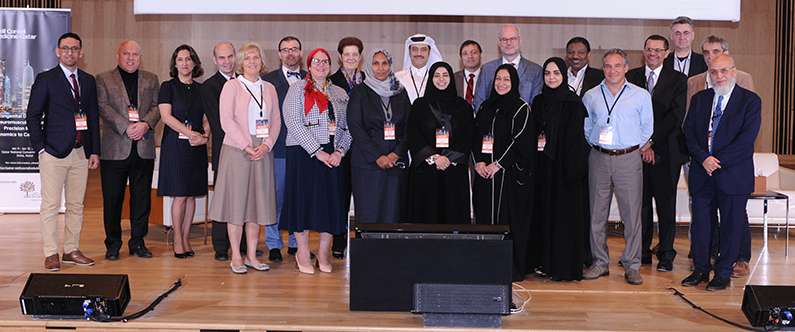WCM-Q hosts international conference on neuromuscular disorders
 Experts from across the world attended the conference, which was organised by Dr. Alice Abdel Aleem (wearing a red headscarf), assistant professor of research in neurology, and assistant professor of research in neuroscience at WCM-Q.
Experts from across the world attended the conference, which was organised by Dr. Alice Abdel Aleem (wearing a red headscarf), assistant professor of research in neurology, and assistant professor of research in neuroscience at WCM-Q.
Weill Cornell Medicine – Qatar has held a three-day conference on congenital dystrophies and the precision medicine associated with neuromuscular disorders, with participants hearing from world-leading experts.
The event took place at Qatar National Conference Centre and involved experts from the region, Europe and the US lecturing on a variety of topics surrounding neuromuscular disorders, with particular reference to congenital dystrophies and myopathies. These conditions are prevalent in Qatar and the wider Gulf, with the conference also focusing on the potential for personalized medicines and new, emerging treatments as well as the challenges in implementing the therapies. The third day of the conference was open to the public and allowed members of the community and patients’ families to meet and discuss issues with the international experts and local physicians.
The event was organized by Dr. Alice Abdel Aleem, assistant professor of research in neurology, and assistant professor of research in neuroscience at WCM-Q, and consultant in clinical genetics at Hamad Medical Corporation
Dr. Abdel Aleem said: “It has been fascinating to hear of the latest therapies that are being developed and to learn from some of the foremost authorities on neuromuscular disorders in the world. Because of the prevalence of consanguineous marriages in the Gulf, the region has a relatively high incidence of congenital disorders, so the third day of the conference was particularly important as it allowed the community to discuss issues with experts face-to-face. It was a great opportunity, indeed, having Prof. Markus Ruegg from the University of Basel in Switzerland joining us. Prof. Ruegg is the scientist who discovered the first emerging gene therapy treatment for one of the most common and devastating congenital dystrophies that is also most prevalent in Qatari patients. The development of clinical trials in humans, for this treatment, is anticipated to start in two years.
Events like this demonstrate that Qatar takes healthcare very seriously and that it is a regional hub for biomedical research excellence. The benefits of this unique scientific gathering go beyond the days of the conference and it is really an excellent stimulus to grow neuromuscular services and research in Qatar even more.”

International speakers at the conference included Dr. Volker Straub, deputy dean of the Institute of Translational and Clinical Research at Newcastle University in the UK and director of the MRC Centre for Neuromuscular Diseases in UK, who spoke about magnetic resonance imaging in diagnosing muscle disease; Dr. Elizabeth Ross, director of the Center for Neurogenetics at Weill Cornell Medicine in New York, who spoke about features of the human brain associated with congenital muscular dystrophies; and Dr. Carsten G. Bönnemann, chief of the neuromuscular and neurogenetic disorders of childhood section at the Porter Neuroscience Research Center in Maryland in the US, who discussed emerging therapies and the development of clinical trials in congenital muscular dystrophies. Dr. Rita Horvath, director of clinical genetic research into rare neurological disorders at the University of Cambridge, delivered a lecture om mitochondrial diseases; Dr. Christophe Beroud from Aix-Marseille University Medical School in France, spoke about the sequencing diagnostic tree he has invented in his laboratories which enable the simultaneous diagnosis of a group of congenital muscular dystrophies; Dr Andoni Urtitzberea, director of the Summer School of Myology in Paris, gave a talk about his 20 years’ journey investigating neuromuscular disorders; and Dr Gustavo Dziewczapolski, the scientific director of the Cure Congenital Muscular Dystrophy Foundation in the US, outlined how the patients’ advocacy organization can take a role in influencing the decisions made by health authorities.
There were also speakers from Qatar, including Sheikh Dr. Mohammed Bin Hamad Al-Thani, director of the Public Health Department at the Ministry of Public Health, who spoke to delegates about how the burden could be reduced on families who have relatives with congenital dystrophies. Dr. Mahmoud Fawzi, senior attending physician in pediatric neurology at Sidra Medicine, presented the epidemiology of neuromuscular disorders in Qatar, while Dr. Khalid Ibrahim, senior attending physician in pediatric neurology at Sidra Medicine, outlined the types of spinal muscular atrophy found in Qatar. Dr. Nahla Afifi, director of Qatar Biobank, detailed the work they carry out and explained how the resource has an important role to play in future research.
Recommendations made at the conference included the involvement of the public and primary healthcare sectors in raising awareness of congenital dystrophies and optimizing early diagnosis. It was also suggested that Qatar should be involved in upcoming clinical trials for a specific type of congenital muscular dystrophy because of its prevalence within the country, and that a registry should be created for the neuromuscular disorders found here.
The public forum on the third day allowed patients with neuromuscular disorders and their families speak to experts directly, and provided information about the best healthcare guidelines, disease prevention, emerging clinical trials and patients’ perception of their condition.
Dr. Khaled Machaca, senior associate professor of research, innovations and commercialization, said “The conference has been highly successful in bringing global experts to Qatar to discuss and share their knowledge with clinicians and the general public. It once again demonstrates the importance that Qatar places on healthcare and can only be of benefit to people who are affected by congenital dystrophies and neuromuscular disorders.”
The conference was funded by a grant from Qatar National Research Fund, a member of Qatar Foundation, under its Workshop Conference Sponsor Program Cycle 16.